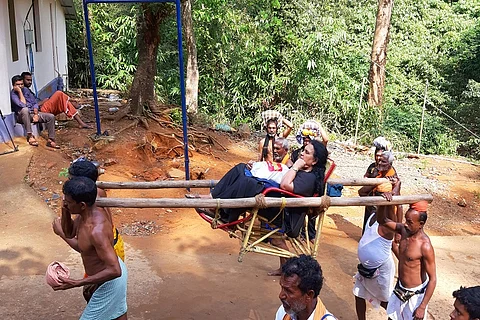

Anyone visiting Sabarimala shrine for the first time will be fascinated to see some people calling out “dolly, dolly” while carrying poles with a chair suspended from it, on their shoulders. In Sabarimala, this is called the dolly system. While this is likely to give one the impression that this part of the country still follows monarchy, dolly system in Sabarimala is an age-old carriage service for the elderly devotees and those with physical disabilities, who come to visit the shrine.
Just like the food stall vendors and the vendors selling ghee and oil in Sabarimala and Pamba, the dolly carriers also depend on the Ayyappa temple for their livelihood. However, unlike the previous pilgrimage seasons, this year has not been a smooth ride for the dolly workers. The Supreme Court verdict, allowing the entry of women of all ages into Sabarimala, and the subsequent prohibitory orders for devotees, have led to violent protests in many parts of the state, including Nilakkal and Pamba, thus discouraging devotees from visiting the temple.
Meet the dolly workers
The moment one steps foot at the KSRTC bus stand in Pamba during the pilgrimage season, one will be welcomed by dolly carriers offering their services, the same way potters welcome passengers deboarding a train.
“This is our occupation - carrying devotees who cannot walk, to the Sannidhanam and bringing them back,” said 41-year-old Ayyanar, a native of Tenkasi in Tamil Nadu, who has been working as a dolly worker in Pamba for the last 12 years.

Each dolly is usually carried by four men on their shoulders and they carry the devotees from Pamba, all the way up to the Sabarimala Sannidhanam, which is a five-kilometre climb. After the devotee is done with the darshan, he/she is carried all the way back to Pamba by the same four men.
Ayyanar, along with three others - Ganesan, Murugan and Velayudhan, had just completed a trip and was waiting to drink ‘soda naranga’ (lime soda) from a stall in Pamba.
Speaking to TNM, Ayyanar said that they get tired but a glass of lime soda quickly rejuvenates them and they will be ready to work again. “But we don’t do more than two trips each day. We are also humans,” he quips.
Later, he adds, “We have been doing this for years. We keep Lord Ayyappa in our mind when climbing and we can never get tired. Besides, we take short breaks between the climb to Sabarimala.”
According to Ganesan, a 45-year-old native of Tenkasi, there are more than 250 dollies in Pamba and more than 2,000 dolly workers, who come from various parts of Tamil Nadu, Andhra Pradesh and Kerala.

“Our names are registered at the Devaswom Board office in Pamba. They issue us a card that states that we are registered dolly workers,” says Ganesan.
Every year, the number of pilgrims availing of this service varies. But, according to the dolly workers, during Makaravillaku, there is a demand for at least 200 dollies on most days.
The rates for the dolly trips are fixed by the Travancore Devaswom Board. A single trip to the Sannidhanam costs Rs 2,200 and a complete to and fro trip costs Rs 4,200. “From each trip, we have to pay Rs 200 to the Devaswom Board and the rest is divided among the four of us,” says Velayudhan.
Sabarimala crisis threatens dolly workers
According to Murugan, one of the dolly workers, “The violent protests over Sabarimala have instilled a fear in the minds of many devotees, who have been depending on dollies for the last several years. There are devotees who personally call us each year and tell us when they are coming. This year, when we called some of our regular customers, they said they were doubtful if they would come because of the existing issue.”
Hoping to get a trip, Sasi, a native of Neyyattinkara in Thiruvananthapuram, eagerly waits at the KSRTC bus stand. “Normally, when the Makaravilakku season begins, we are sure to get one or two trips every day; but in the last few days, we have only managed to get a single trip when we are supposed to get at least four,” Sasi tells TNM.
“This occupation is our only source of income and if things go the way it is, we don’t know how we are going to make ends meet,” said Sasi, adding, “The first two days since the Makaravilakku season began, many workers did not earn a single rupee. There have been discussions among the dolly workers to leave this profession and go back to their native places to find other work,” says Sasi.

Shoulders of a dolly carrier in Sabarimala. Picture Credits: Pramod Madhav.
To make things worse for these dolly workers, the flood-ravaged state of pamba has also discouraged many of the devotees from making their pilgrimage.
Ayyanar feels that the Devaswom Board should seriously consider doing something to ease the lives of the dolly workers. “We don’t even have a proper shelter to rest here. Even basic necessities such as food and water are not taken care of by the board. We have to pay for the food we eat with the money we get from the trips. To add to it, the board has also not increased the rates of the dolly service in the last three years,” said an emotional Ayyanar.
Even as the attention of the world falls on this famous temple in Kerala, the struggles faced by people like Ayyanar, Murugan, Ganesan and Sasi, who have been carrying the devotees on their shoulders to worship Lord Ayyappa go unnoticed.
“Life was never easy for us but we always used to manage. But this is probably the first time in our lives that we are feeling the burden on our shoulders,” says Ayyanar as he joins other dolly workers to make sense of what the journalists are talking in front of the camera.